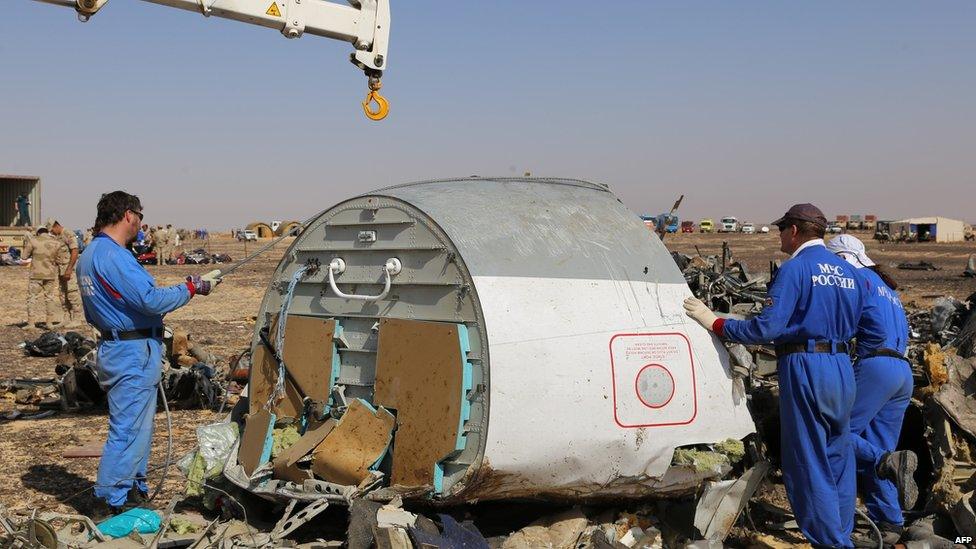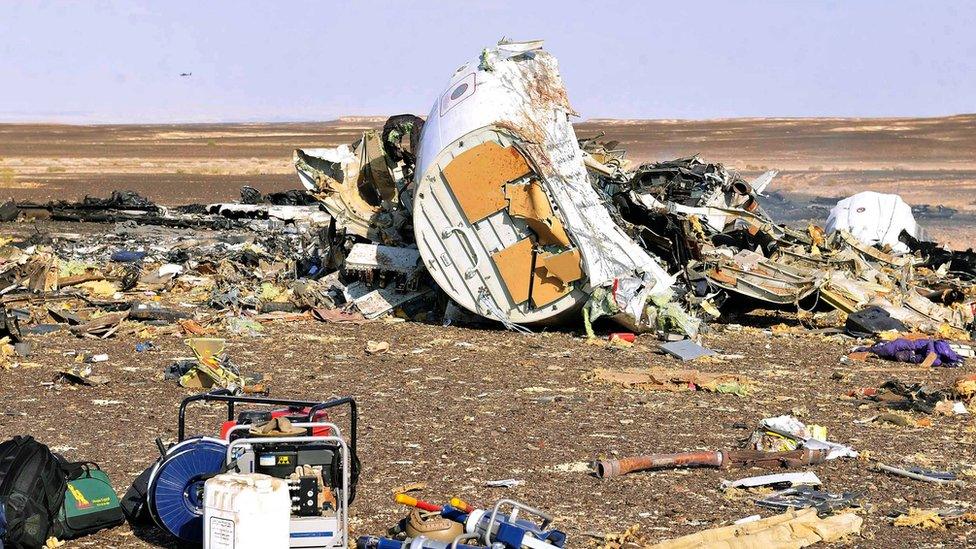Could Islamic State have bombed Flight 9268?
- Published

All 224 people on board the airliner were killed when it crashed over Egypt
When an Islamic State affiliate in Egypt claimed responsibility for the downing of a Russian airliner on Saturday, analysts were initially sceptical about the group's ability to bring down a passenger jet.
Neither IS nor its Egyptian affiliate, which calls itself Sinai Province, is thought to possess missiles capable of hitting an airliner at cruising altitude, and neither has a track record of aviation attacks.
But five days on from the crash, which killed all 224 people on board shortly after take-off from the Egyptian resort of Sharm el-Sheikh, David Cameron has said it is "more likely than not a terrorist bomb" brought down the plane, and the UK has grounded flights from the resort.
British military officials are now on their way to Egypt and security at Sharm el-Sheikh airport is under intense scrutiny. Julian Bray, an aviation security analyst, told the BBC it is "highly probable" that even a relatively unsophisticated terror group could get a bomb on to a jet leaving the resort.
"It is unlikely a passenger would be able to carry it on board the aircraft, but it is quite likely it could have been taken into somewhere like the cargo shed and then into a container in the plane," he said.
"All passenger aircraft nowadays carry cargo as well, which often comes as a complete sealed unit, and the concern is that at airports like Sharm security is lax around cargo.
"A lot of the airports in the Far East and Middle East are running on a shoestring and they have to turn round aircraft and cargo as fast as possible.
"That leads to skimping on security procedures."


Egypt has criticised suggestions that a bomb was involved in the crash. Civil Aviation Minister Hossam Kamal said the country's airports all comply with international security standards.
Investigators are yet to reveal any information from the aircraft's black box recorders and there is no concrete evidence of a bomb attack.
US media reported on Tuesday that a military satellite detected a "heat flash" over Sinai at the time of the crash, suggesting an explosion, but officials said they have not ruled out a technical malfunction.
On Wednesday, Sinai Province, which first emerged as jihadist group Ansar Beit al-Maqdis - or Champions of Jerusalem - in 2011, reiterated its claim of responsibility in an audio recording circulated on social media, but refused to give any details about the method used.
"We brought it down by God's help, but we are under no obligation to reveal the mechanism we used," the statement said. "So search the wreckage of the plane, and find your black box and analyse it."
Did bomb cause Sinai plane crash?
The data retrieved from the black boxes may reveal whether a bomb was involved. If Sinai Province's claim is corroborated, it will be the first IS attack against a passenger aircraft - a grisly milestone for the terror organisation.
Spectacular attacks against civilian targets - especially planes - have so far been the preserve of IS's much older rival, al-Qaeda, which was behind 9/11.
AQAP, al-Qaeda's branch in Yemen, claimed responsibility for two bombs discovered unexploded on cargo planes in 2010 - one in London and one in Dubai. The 300-400g devices - large enough to bring down a plane - were hidden in printer cartridges aboard cargo flights from Yemen.
Both packages were destined for Chicago and timed using mobile phones to detonate over the US mainland.
And in 2010, the CIA said it had foiled a plot by AQAP to smuggle a technically advanced bomb on board an airliner bound for the United States.
By contrast, IS has so far focused on taking land and hostages, and inspiring lone wolf attacks in other parts of the world rather than planning its own sophisticated operations.

Debris from the plane was spread over a wide area, indicating it broke up in mid-air
Many analysts have been waiting for a high-profile terror attack by IS, according to Dr HA Hellyer, a Middle East expert with the Royal United Services Institute. But the scale of the Metrojet attack would nonetheless be a surprise, he said.
"I don't think anybody expected an attack on a plane, maybe on a hotel or a kidnapping ... but nobody expected something this large," he said.
"I don't think it will surprise anyone such a radical and extremist group has targeted civilians, but certainly the nature of this attack is very dramatic."
If the attack is confirmed it would be a significant propaganda coup for IS, according to Dr Hellyer. "It would mean that they've taken out a huge number of civilians at once, and struck a blow against two of their enemies at once, Russia and Egypt."
And it will remain a success of sorts for IS even if investigators rule that the plane was brought down by a technical fault, he said.
"If it turns out that they didn't do it, that is still a victory in a sense. We are having this conversation now. They have managed to dominate the discussion, and that in itself is a communications victory."